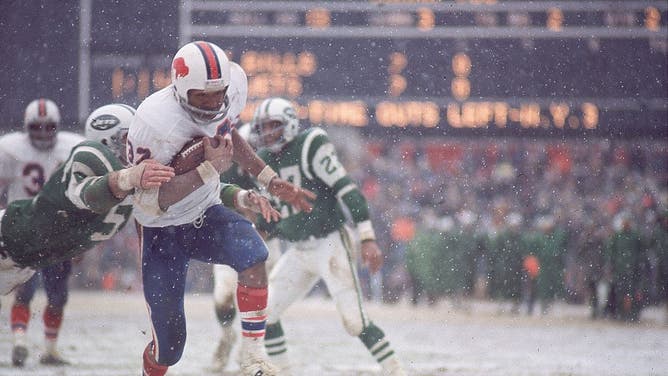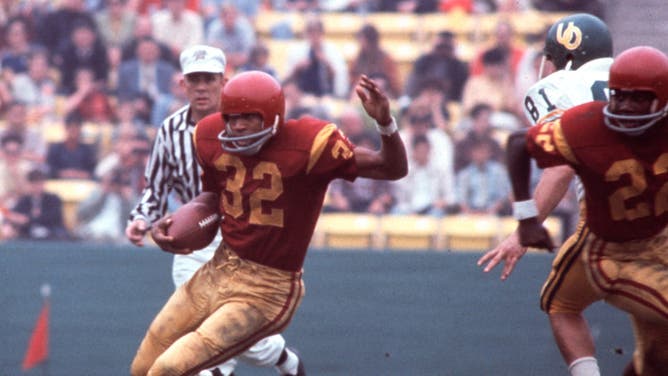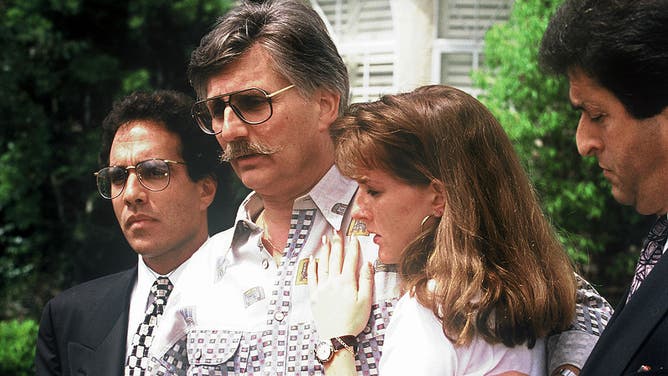O.J. Simpson's Lasting Legacy Will Be The Chaos He Caused Even In Death | Armando Salguero
The memory of O.J. Simpson gliding as if on skis through falling snow at old Shea Stadium, chasing a seemingly unattainable mark while defenders vainly grasped only at his passing shadow, is murky now.
Simpson rushed for 200 yards in those horrible December 1973 conditions and on one of his final plays, a seven-yard run, he broke through the 2,000-yard rushing mark that had never before been reached.
Simpson to this day is the only NFL running back to rush for over 2,000 yards (he rushed for 2,003 to be exact) in a 14-game season.
That was O.J. Simpson at his height.

UNITED STATES - DECEMBER 09: Football: Buffalo Bills O,J, Simpson (32) in action, rushing vs New York Jets, Snow, weather, Flushing, NY 12/16/1973 (Photo by John D. Hanlon/Sports Illustrated via Getty Images) (SetNumber: X18253 TK1 R2)
O.J. Simpson's Feats Are Marginalized
But that greatness was sullied long ago. His Hall of Fame career was stained long ago. That memory, fading in the minds of an aging generation, long ago was overshadowed by the other stuff.
Simpson died on Thursday at the age of 76 from prostate cancer that left him frail and bedridden at the end. His family confirmed Simpson's death and, oddly, requested privacy to mourn the passing of a man who loved the limelight and the public eye.
And now the way Simpson leaves this Earth is similar to how he left opposing defenses: In full-blown chaos.
Thursday offered tons of it right after the announcement.
READ: New York Times Tweaks Its O.J. Simpson Obit After Showing Sympathy Towards The Alleged Murderer
Simpson's death tripped up obituary writers from the New York Times and other legacy media sites trying to strike a balance between Simpson-the-football-hero and the convicted felon and alleged villainous murder.
The death put sports institutions in a tough spot, as they tried to acknowledge what he did as a professional athlete without celebrating the man.
The Pro Football Hall of Fame probably did the best job, merely recognizing the news of the day without emotion:
"O.J. Simpson was the first player to reach a rushing mark many thought could not be attained in a 14-game season when he topped 2,000 yards," Hall of Fame president Jim Porter said. "His on-field contributions will be preserved in the Hall’s archives in Canton, Ohio."
Milquetoast. But safe.
Heisman Trophy Trust Blows It
The Heisman Trophy Trust wasn't so deft. It tweeted its sympathies for the Simpson family.
READ: Heisman Trophy Trust Brutally Roasted For O.J. Simpson Death Tribute
But once the organization, which awards the Heisman Trophy that Simpson won in 1968, said it "mourns" Simpson's passing, the responses got very angry.
Among the responses:
"I mourn for the Browns and Goldmans and send them my sympathy. But you do you."
And …
"Reggie didn't kill anyone and he doesn't have his trophy."
The general thought that last comment conveyed was everywhere in the responses. Reggie Bush was basically forced to forfeit his 2005 Heisman Trophy when the NCAA found he'd received improper cash and other benefits from marketing agents while at USC.
And while that was against the NCAA bylaws in 2005, players today receive cash and cars and other things under the current NIL system.

EUGENE, OR - NOVEMBER 2: Running back O.J. Simpson #32 of the USC Trojans runs the ball against the Oregon Ducks at Autzen Stadium on November 2, 1968 in Eugene, Oregon. USC defeated Oregon 20-13. (Photo by Rich Clarkson/NCAA Photos via Getty Images)
Social Media Remembers Simpson Crimes
So it seems odd to some people that the Heisman Trust took back Bush's trophy because of cash and cars, while Simpson kept his trophy after a civil court jury found him liable for causing the death of Ronald Goldman and for battery against Goldman and former wife Nicole Brown Simpson.
The Heisman Trust was similarly not moved by Simpson's conviction in a Las Vegas felony robbery and kidnapping case.
So, not a great look for the Heisman.
I spoke with Dolphins running back Mercury Morris at length on Thursday, and he's decided to remember Simpson fondly because they were both friends and rivals. That's his prerogative.
But, as mentioned in the story, Morris is very much in the minority.
READ: Longtime Friend Mercury Morris Has Fond Memories, And Made No Judgment Of O.J. Simpson
Because while Simpson won at the 1995 criminal trial for the murder of Brown and Goldman, he long ago lost in the court of public opinion.
A 2016 poll published in the Washington Post showed that decades after the criminal trial, Americans generally agreed Simpson got away with murder.
That poll showed 83 percent of white Americans and 57 percent of black Americans believe Simpson committed the murders.
That doesn't mean Simpson's actions in any way brought the country together. Quite the contrary.
Even in the relative prosperity of the 1990s, the Simpson jury verdict initially divided the country along racial lines. Simpson's actions did that. He was the catalyst of that.
And the pain he caused will continue from the grave.

Fred and Kim Goldman, father and sister of Ronald Goldman, appear in front of the media June 15, 1994 at their home in Agoura Hills, CA, following the murder of Ronald and O.J. Simpson's ex-wife Nicole Brown Simpson. (Photo by Lee Celano/WireImage)
Statement From Goldman Family
The Goldman family, led by father Ron and sister Kim, on Thursday released a statement expressing some disappointment over Simpson's death but only because it robs them of getting the sort of confession and closure they've sought for decades.
"For three decades we tirelessly pursued justice for Ron and Nicole," the statement said in part. "…The hope for true accountability has ended."
So, no, the memory many of us will keep of Simpson is not from that record-breaking Sunday in Queens. Or that amazing 1973 season. Or the Heisman Trophy campaign.
We'll remember the Bronco chase. And the trial of the century. And the gruesome, bloody photos of a murder scene. We'll remember Simpson acting as if the glove did not fit.
We'll remember all that chaos Simpson leaves – even in death.